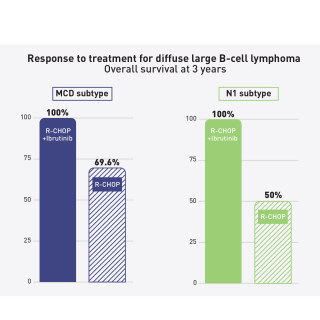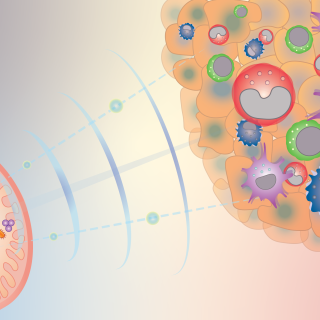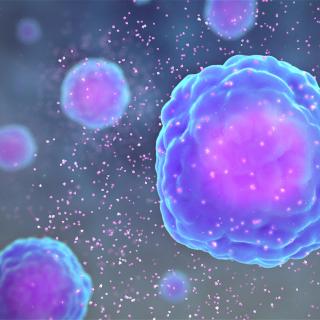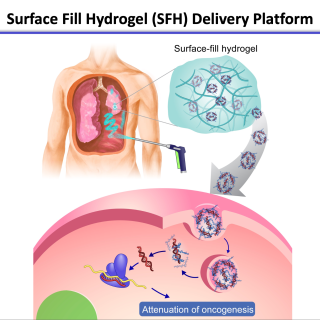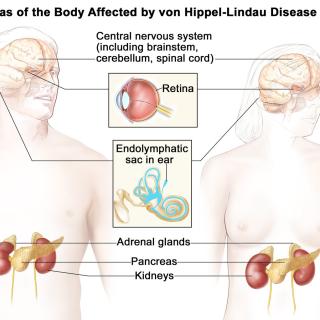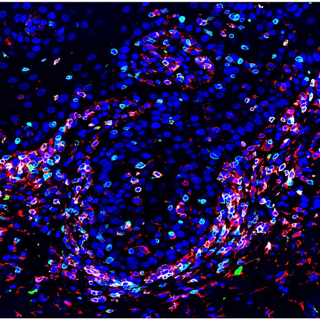Our Discoveries
Ibrutinib improves survival for younger people with diffuse large B-cell lymphoma
New evidence suggests that adding the drug ibrutinib to a standard chemotherapy regimen can improve how long some younger people with a specific form of diffuse large B-cell lymphoma live. The findings come from a new analysis led by Louis M. Staudt, M.D., Ph.D., Chief of the Lymphoid Malignancies Branch, of a previous phase III clinical trial.
Read MoreGut bacteria sculpt innate immunity within the tumor microenvironment
New research reveals how gut bacteria reprogram innate immune cells to activate and recruit cells important for anti-cancer immunity, keeping tumor growth in check and improving the response to cancer immunotherapy.
Read MoreNew tool helps researchers make sense of complex immune signals
Drawing on thousands of prior studies, CCR scientists have developed a computational tool that helps predict how immune cells’ molecular communications impact cancer, infection control and inflammatory disease.
Read MoreNewly developed gel can be used to treat cancers that form on organ surfaces
Researchers at CCR engineered a hydrogel carrying nanoparticles that can be sprayed or administered by syringe as part of a surgical strategy for cancers that develop on the outer surface of organs. When applied topically, the gel can reach small deposits of cancer cells that might have been missed during surgery. This approach has the potential to change the treatment paradigm for mesothelioma and possibly for other cancers that form on the surface of organs.
Read MoreBlood test reveals when benign NF1 tumors turn cancerous
People with neurofibromatosis type 1 (NF1) often develop non-cancerous, or benign, tumors that grow along nerves. These tumors can sometimes become cancerous, but there hasn’t been a good way to determine whether this transformation to cancer has happened. In a new study, researchers co-led by Jack F. Shern, M.D., Lasker Clinical Research Scholar in the Pediatric Oncology Branch, have developed a blood test that could one day offer a highly sensitive and inexpensive approach to detect cancer early in people with NF1.
Read MoreFDA approves belzutifan, first drug for cancers associated with von Hippel-Lindau disease
On August 13, 2021, the Food and Drug Administration approved belzutifan, a new drug for adult patients with von Hippel-Lindau (VHL) disease-associated renal cell carcinoma (RCC), central nervous system hemangioblastomas, or pancreatic neuroendocrine tumors, not requiring immediate surgery.
Ramaprasad Srinivasan, M.D., Ph.D., Investigator in the Urologic Oncology Branch (UOB), designed the ongoing study and played a key leadership role as the principal investigator on the cooperative research and development agreement under which NCI served as a site in the study. Belzutifan is now the first and only approved systemic therapy for certain patients with VHL-associated RCC.
VHL disease is a rare, inherited disorder that causes tumors and cysts to grow in certain parts of the body. Patients with this disease have an increased risk of certain types of cancer, especially kidney cancer and pancreatic cancer. The VHL gene was originally identified by Marston Linehan, M.D., and colleagues in the UOB in the 1990s, and the group continues to define the methods for clinical management of VHL disease.
Read MoreCollaborative study leads to FDA approval of belumosudil for chronic graft-versus-host disease
The Food and Drug Administration (FDA) approved belumosudil on July 16, 2021, for people 12 years and older with chronic graft-versus-host disease (cGVHD) after failure of at least two prior lines of systemic therapy. Chronic GVHD is a complex condition that can be life threatening and occurs when donated stem cells attack healthy tissues in a patient’s body. Steven Z. Pavletic, M.D., M.S., Senior Clinician in the Immune Deficiency Cellular Therapy Program, guided CCR’s involvement in the pivotal consortium study that led to FDA approval of belumosudil. Pavletic was part of the trial clinical leadership at CCR, one of the 28 centers that enrolled study patients. The study found belumosudil to be safe and well-tolerated, and it may have the potential to improve overall patient well-being.
Read MoreProtein that drives aggressive liver cancer identified
Cancers with more protein diversity (heterogeneity) tend to be more aggressive and less responsive to treatment. CCR researchers led by Xin Wei Wang, Ph.D., Deputy Chief of the Laboratory of Human Carcinogenesis and co-Director of the CCR Liver Cancer Program, have identified a protein that may drive an evolution toward greater heterogeneity in two forms of liver cancer.
Read MoreImmune cells promote breast cancer’s metastasis to the brain in young mice
Animal studies led by Patricia S. Steeg, Ph.D., Deputy Chief of the Women’s Malignancies Branch, suggest that younger immune systems promote breast cancer’s metastasis to the brain — but that the risk can be reduced by triggering immune changes that usually occur later in life.
Read MoreInternational study of rhabdomyosarcoma finds genetic clues, potential for tailored therapy
New findings from the largest-ever international study on rhabdomyosarcoma – the most common type of soft tissue sarcoma in children – suggest that children with the disease could benefit from tumor genetic testing. Javed Khan, M.D., Deputy Chief of the Genetics Branch, led the study.
Read More